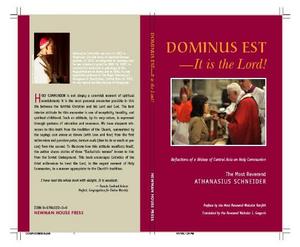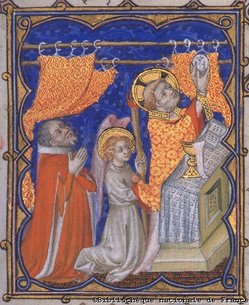Bishop Athanasius Schneider, an auxiliary bishop of the Diocese of Karaganda,
 Kazakhstan, published a book, Dominus Est, dealing with the history, theology and pastoral practice of receiving Holy Communion. The book is reviewed by Dr. Alcuin Reid.
Kazakhstan, published a book, Dominus Est, dealing with the history, theology and pastoral practice of receiving Holy Communion. The book is reviewed by Dr. Alcuin Reid.
No doubt many of us receive Holy Communion without considering what the gesture of receiving means at the level of symbol, that is, at the level of deepest reality. We are given "a pledge of future glory," says the prayer of Saint Thomas Aquinas, so what does it mean to mean receive this pledge in the hand? Theologically, does it mean anything to receive the Lord in the hand versus on the tongue? Do we take a gift or do we receive a gift? I wonder if the hand is the most appropriate "tool" to receive the Eucharistic Lord. If we truly believe one's reception of the Lord in Communion is an act of reception not an act of taking, then is receiving the Lord in the hand and picking Him up with our fingers the most appropriate act of worship? The question needs to be answered in terms of how Communion is received so that we know at the deepest places in the heart, that we are receiving the Lord Himself. How does our reception of Communion exhibit the deepest reverence for the Blessed Sacrament?
The liturgy establishment -and those who pretend to know the liturgical life of the Church--have argued that receiving Communion in the hand is rooted in the practice of apostolic times. The author argues that scholars, as well as bishops and priests, have misread the early church documents about the practice of receiving Holy Communion in the hand and therefore what we know today bears no resemblance to how our Christians received Holy Communion in apostolic period. The point, therefore, is that our scholars and priests have used an archeologistic argument to force the issue of receiving Communion in hand by saying that people didn't receive communion on the tongue in the earlier periods of Church history.
 This is not only a matter for the laity. The ordained need to reflect on how they receive the Eucharistic Lord, too. There is ample evidence that what the priests do today is also theologically suspect. In the earlier centuries of the Church no one, not even the pope and bishops, self-communicated Communion. Even though prayer the great Eucharistic prayer he would never presume to take Communion; It was administered to the pope, bishops and priests by the deacon. But I digress.
This is not only a matter for the laity. The ordained need to reflect on how they receive the Eucharistic Lord, too. There is ample evidence that what the priests do today is also theologically suspect. In the earlier centuries of the Church no one, not even the pope and bishops, self-communicated Communion. Even though prayer the great Eucharistic prayer he would never presume to take Communion; It was administered to the pope, bishops and priests by the deacon. But I digress.
The book retails for $8.00, with 50% off for five or more copies to the same address ($2 each for shipping/handling). Send to: Newman House Press, 601 Buhler Court, Pine Beach, NJ 08741. Or visit: http://jhcnewman.org.

